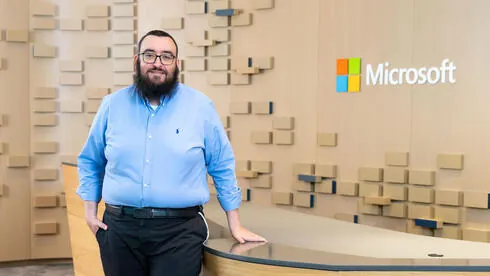
From Yeshiva to Silicon Valley: How Rabbi Yitzhak Kesselman Became Microsoft's Corporate Vice President
2025-03-16
Author: Daniel
Introduction
In a remarkable fusion of faith and technology, Rabbi Yitzhak Kesselman, a 40-year-old Chabad Hasid, has achieved an extraordinary milestone by becoming a corporate vice president (CVP) at Microsoft.
Leadership at Microsoft
As the highest-ranking ultra-Orthodox engineer in the company, Kesselman leads the 'real-time data analytics' sector, overseeing cutting-edge management software known as Fabric. This innovative platform empowers non-technical users to extract valuable insights from extensive data sets, positioning it as a crucial tool for the future of artificial intelligence, as emphasized by Microsoft CEO Satya Nadella during a recent conference.
Early Life and Background
Residing in New York with his wife and five children, Kesselman's journey to the forefront of technology began far from the world of corporate boardrooms. Born in Riga, Latvia, into a secular family, he made aliyah to Israel at the age of six. Growing up in a diverse Jewish-Arab neighborhood in Ramla, Kesselman's experiences shaped his worldview and sparked his spiritual awakening during his teenage years.
Military Service and Education
His path took a significant turn when he served in the Israel Defense Forces (IDF) as part of the academic reserve program, where he balanced military duties with rigorous academic pursuits. In a heartfelt LinkedIn post, Kesselman shared his dual commitment to studying advanced math and data structures while immersing himself in Talmudic studies at yeshiva.
Career Progression
After his service, Kesselman honed his technical skills at Retalix before joining Microsoft in 2013 as a product manager. He briefly left for Google in 2021, relocating to New York, but soon returned to Microsoft, ascending quickly to a vice presidency overseeing 400 global employees, many based in Israel.
Advocacy and Community Engagement
Despite his professional accomplishments, Kesselman remains deeply committed to bridging the gap between the tech industry and the ultra-Orthodox community. He advocates for integrating ultra-Orthodox individuals into technology roles, emphasizing that 'we didn't lower the bar – we just removed some barriers.' His own experiences navigating societal stigmas have motivated him to foster inclusivity and understanding within the workforce.
Personal Values and Beliefs
His upbringing in Ramla, surrounded by a mix of cultures and beliefs, has profoundly influenced his perspective on diversity. At his wedding, the celebration included friends from all walks of life, illustrating his belief in the power of connection. Kesselman noted that the Lubavitcher Rebbe, a revered figure in Chabad, was himself an engineer and viewed technology as a means to improve the world, aligning perfectly with Kesselman’s values.
Faith and Profession
He firmly believes there is no conflict between his profession and his faith. 'Our purpose is to perform acts of kindness in the world,' he asserts. His commitment to developing technologies that genuinely benefit people imbues his work with profound meaning, showcasing how personal beliefs can inspire transformational changes in the corporate landscape.
Conclusion
As Kesselman continues to break barriers and pave the way for future generations, his story serves as an inspiring testament to the potential of embracing both faith and innovation in today’s ever-evolving technological sphere.


 Brasil (PT)
Brasil (PT)
 Canada (EN)
Canada (EN)
 Chile (ES)
Chile (ES)
 Česko (CS)
Česko (CS)
 대한민국 (KO)
대한민국 (KO)
 España (ES)
España (ES)
 France (FR)
France (FR)
 Hong Kong (EN)
Hong Kong (EN)
 Italia (IT)
Italia (IT)
 日本 (JA)
日本 (JA)
 Magyarország (HU)
Magyarország (HU)
 Norge (NO)
Norge (NO)
 Polska (PL)
Polska (PL)
 Schweiz (DE)
Schweiz (DE)
 Singapore (EN)
Singapore (EN)
 Sverige (SV)
Sverige (SV)
 Suomi (FI)
Suomi (FI)
 Türkiye (TR)
Türkiye (TR)
 الإمارات العربية المتحدة (AR)
الإمارات العربية المتحدة (AR)